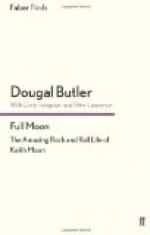His professional interest in the case had been greatly quickened by his first sight of Flint House. Never had he seen anything so weird and wild. The isolation of the place, perched insecurely on the edge of the rude cliffs, among the desolation of the rocks and moors, breathed of mystery and hinted at hidden things. But who would find the way to such a lonely spot to commit murder, if murder had been committed?
Reaching the end of the long passage, he first turned towards the study on the right. The smashed door swung creakingly back to his push, revealing the interior of the room where Robert Turold had met his death. Barrant entered, and closed the broken door behind him. It was here, if anywhere, that he might chance to find some clue which would throw light on the cause.
The profusion of papers which met his eye, piled on the table and filling the presses and shelves which lined the musty room, seemed, at the outset, to give ground for the hope that such an expectation might be realized. But they merely formed, in their mass, a revelation of Robert Turold’s industry in gathering material for his claim. There were genealogical tables without number, a philology of the two names Turold and Turrald, extracts of parish registers and corporation records, copies from inscriptions from tombstones and mural monuments, copied pedigrees from the British Museum and the great English collections, a host of old deeds and wills, and other mildewed records of perished hands. But they all seemed to have some bearing on the quest to which Robert Turold had sacrificed the years of his manhood.
He had died as he lived, engrossed in the labour of his life. A copy of Burke’s “Vicissitudes of Families” was lying open on the table, and beside it were two sheets of foolscap, covered with notes in thin irregular handwriting. The first of these depicted the arms of the Turrald family, as originally selected at the first institution of heraldry, and the quarterings of the heiresses who had married into the family at a later date.
The second sheet was headed “Devonian and Cornwall branch of the Turolds,” and contained notes of Robert Turold’s ancestral discoveries in that spot. The notes were not finished, but ended abruptly in the middle of a sentence: “It is necessary to make it clea—”
Those were the last words the dead man had written. He had dropped the pen, which lay beside the paper, without finishing the word “clear.”
The sight of this unfinished sheet kindled Barrant’s imagination, and he stood thoughtful, considering the meaning of it. Was it the attitude of a man who had committed suicide? Was it conceivable that Robert Turold would break off in the middle of a sentence, in the middle of a word, and shoot himself? It seemed a strange thing to do, but Barrant’s experience told him that there were no safe deductions where suicides were concerned. They acted with the utmost precipitation or the utmost deliberation.




